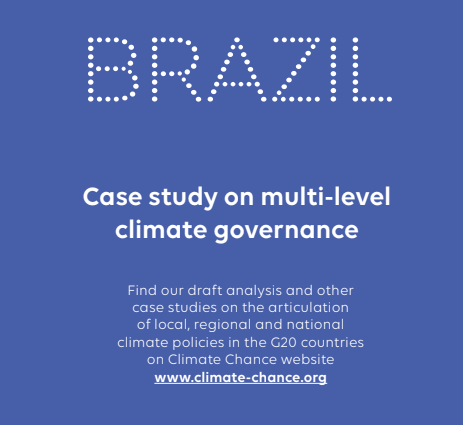Brazil • Multi-level climate governance
The Climate Chance Observatory in collaboration with i care & consult has analyzed the political articulations of climate actions on a local, regional, and national scale in the G20 countries. You will find below the case study on Brazil.

Introduction
Brazil is considered a highly decentralized country since the adoption of the 1988 Federal Constitution. It is divided into 5,570 cities, in 26 states with broad political, administrative, legislative, and financial autonomy. The states are accountable to the Union (Central Government) and the municipalities are accountable to the States. Therefore, all entities have some autonomy, however, some of the responsibilities are divided between the Union and the States (such as providing access to health services and education and protecting the environment). In addition, each entity must respect the laws and rules of the entity within which it is inserted. The Brazilian Constitution does not detail the powers of the states, and it is up to them to define the main rules, noting that, in no way they can contradict the Federal Constitution. The current Federative Pact, which defines the responsibilities and the allocation of resources, is being discussed and a new proposal (Proposed Amendment to the Constitution 188/2019) may cause changes to the current model.
Contents
- Distribution of climate-energy related competences
- National Legislation for local Climate planning and monitoring
– 2000-2010: The institutional and legal framework on Climate chance lacks mechanismes to promote or integrate cities’ and states’ Climate policies
2011-2018: Development of sectoral plans and policies with few obligations or support for cities and regions
– 2019-2020: Skeptiscism of the federal government and strengthening of the cities’ and states’ agenda
– Current planning obligations and monitoring for states and municipalities - Articulation of Climate policy between the different levels of governance
– Linkages between local governments and territories
Linkages between provinces territories and the Federal Government - National and International funding for local Governments
– National Funding
– External Funding
Read our project and other case studies on multi-level climate governance in G20 countries here and check out case studies on France, Germany and Canada.


